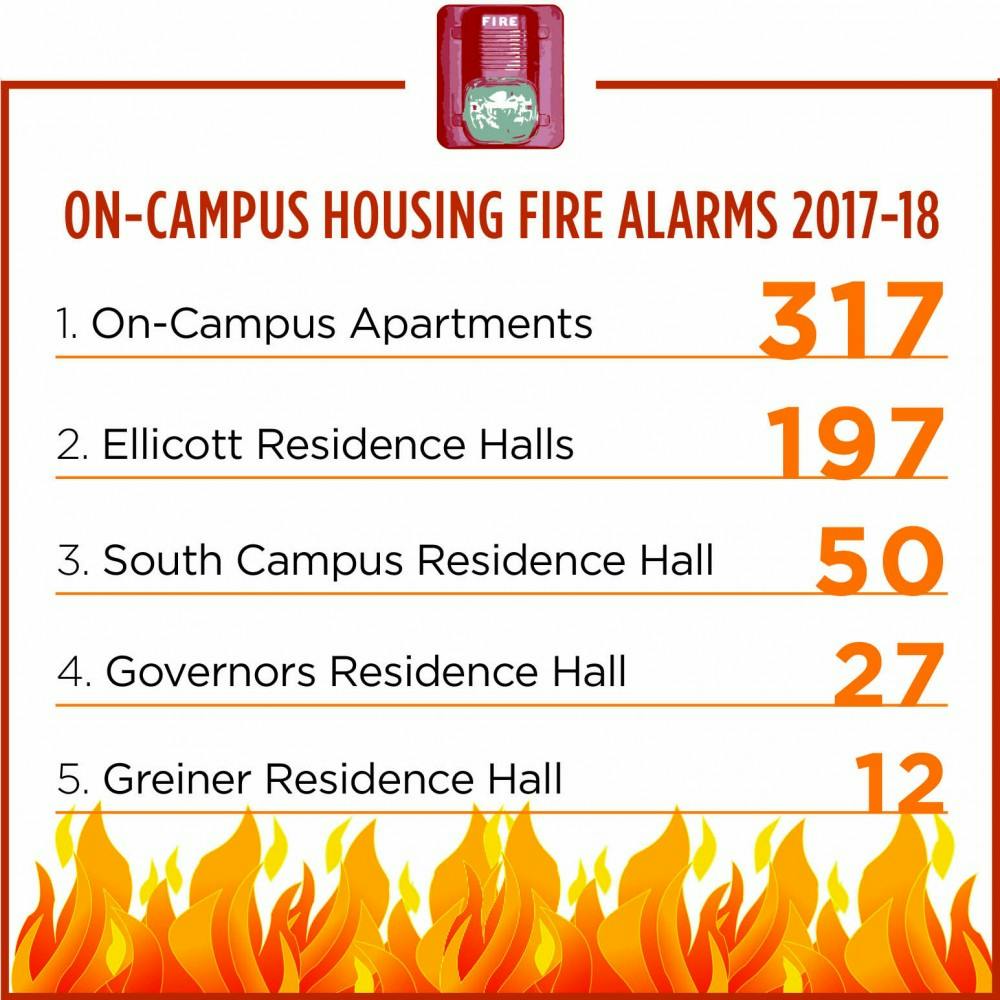Fire alarms are sounding in university residence halls at an alarming rate.
A total of 175 fire alarms have been recorded for on-campus housing for this academic year, as of March 16, according to UPD reports. Residents living in apartments contribute to more than half of the university’s total number of fire alarms, with 91 this year.
Students who live in Flint Village 303 on North Campus are frustrated with how often fire alarms in the building go off. This semester, the apartment complex reported 31 fire alarms. Apartment 303 reported 13 alarms, nearly half of the complex’s fire alarm incidents.
Lindsay Boyle is a junior nursing major and resident of Flint 303. The fire alarm situation has influenced her housing decision for next year. Because of the alarms, she isn’t sure if she wants to live on-campus again.
“We don’t really want to be here, but our parents kind of prefer it. Because of so many inconveniences here, we don’t want to stay,” Boyle said.
Boyle said the fire alarms have been distracting and thinks the system is too sensitive.
“One time we set it off and we were doing nothing but boiling water on the stove for mac and cheese. Just the steam set it off,” Boyle said.
Kimberly Navorroli, senior associate director of university facilities, said the total number of fire alarms in Flint Village has decreased in the last three years, but the cause of the alarms remains the same.
“Most are caused by cooking, smoking and spraying aerosols too close to detectors,” Navorroli said in an email. “Cooking is still the major cause of these alarms.”
Nine of the 13 reported Flint alarms were related to cooking.
On Jan. 30, the building had five fire alarms, three of which were malfunctions. Boyle said UB should consider upgrading the fire alarm system to one that can differentiate between steam and smoke.
The UB Environment, Health and Safety Department said the fire alarm system is tested on its sensitivity every other year. Steven Herberger, EHS fire safety manager, said these tests are to make sure the system responds well to smoke signals.
“The alarms are given the maximum time related to having authentication, where the smoke has to affect the detector for the longest period of time allowed by law, before it actually sets off the alarm off,” Herberger said.
The alarm sequence on campus has a verification time of about 45 seconds to prevent accidentally setting it off, according to Herberger.
Some residents, however, still agree with Boyle. Diamile Tavarez, a biological science major, said she feels fire alarms across campus are too sensitive. Tavarez previously lived in the Ellicott Complex and had similar issues with fire alarms there.
“When I lived in Ellicott, my roommate was just blow drying her hair and it set the alarm off,” Tavarez said. “It wasn’t even a lot of smoke, but the fire alarm went off.”
Evan Frisina, a freshman business major, said he believes the alarms should be placed in better locations in the dormitories.
“They should put them at better places because right now, the fire alarms are right above the kitchen stove. How are you supposed to cook with no steam? It’s just too hard,” Frisina said.
Hadley Village remains one of the on-campus apartments with a consistent increase in fire alarms since fall 2015. Qualeil Miller, a senior political science major, said having more engagement through events and emails on proper safety practice with on-campus residents would be helpful in reducing fire alarms.
“I used to be a community adviser, so I know people who don’t know how to cook properly. They cook with the fire a little too high or microwave dry noodles,” Miller said.
Apartments in Flint and Hadley are reserved for junior and senior undergraduates. Miller said having upperclassmen residents should correlate with lower fire alarms.
“[Campus Living] expects people living in the apartments to already have experienced the dorms, where they have been given past exposure to fire alarms happening,” Miller said. “It’s just incompetence, ignorance and negligence that causes fire alarms.”
To address the issue of fire alarms, Navorroli said Campus Living staff will continue to educate residents on safety procedures.
Wanly Chen is an assistant features editor and can be reached at wanly.chen@ubspectrum.com and @wanly_chen.





